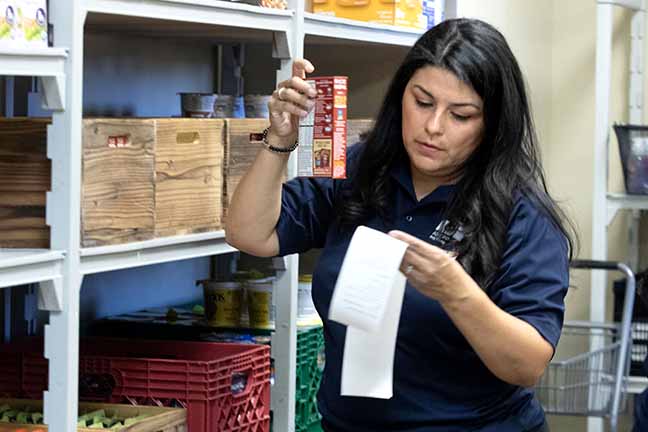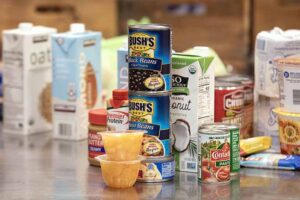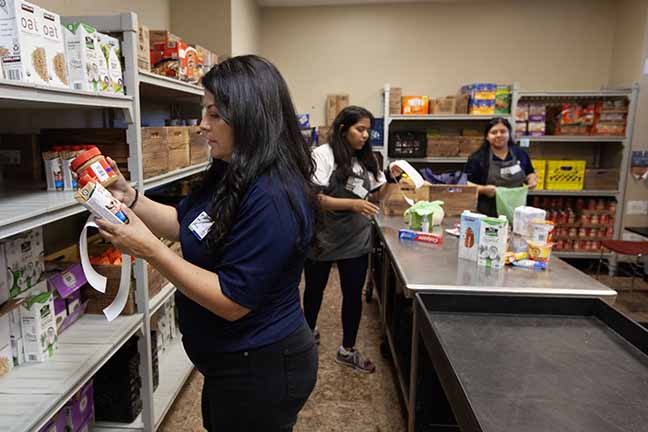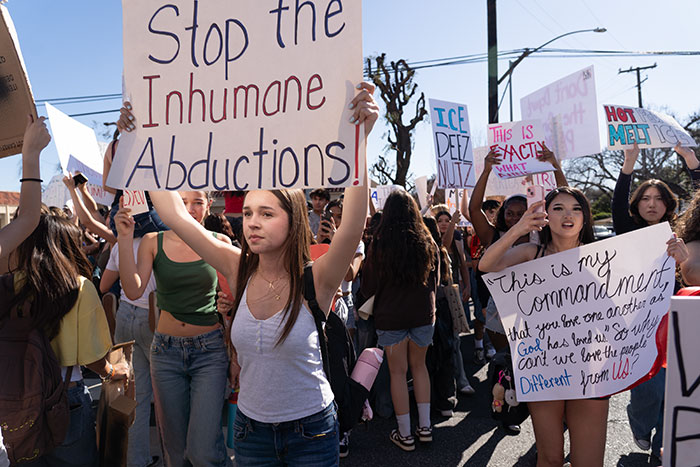A ‘community of care’ at CPP’s Poly Pantry

Poly Pantry Manager Sandy Solano selects groceries for a student’s order Tuesday at Cal Poly Pomona. Courier photo/Steven Felschundneff
By Lisa Butterworth
Every day on the Cal Poly Pomona campus, students working at the Poly Pantry fill bags with items like granola bars, canned soup, almond milk, beans, rice, and a variety of fruits and vegetables. Then the students who have ordered these groceries come and pick them up — for free. The service is a much-needed effort to address a major concern among the school’s population: food insecurity.
“Prior to the pandemic, there was a survey across the entire California State University system, and they found that over 40 percent of students were experiencing some level of food insecurity,” said Associate Professor of Urban and Community Agriculture Aaron Fox. “Food insecurity is a really large scale, but ultimately it means at some point or another during the week, you’re not 100 percent sure where your next meal is going to come from, or whether you will have a meal, all the way to extreme hunger. I think that was a wake-up call for the Cal State Universities.”
In response, Cal Poly Pomona established the Poly Pantry in 2019. Back then, the services were very limited. It was an in-person shopping experience, items offered were based solely on what items had been donated, and there were income-based restrictions on who could be served, said Poly Pantry Manager Sandy Solano. Now, thanks to a bit of funding from the student-led Associated Students, Inc., the Poly Pantry is able to buy many of the items they need, including personal care products and even a few school supplies; students can place their orders online, which alleviates some of the stigma attached to using the service; and no one in need is turned away as long as they are enrolled in Cal Poly Pomona classes.
Last year, the Poly Pantry served about 1,700 students. “This year, I can tell already that it has increased,” said Solano. “I haven’t even looked at the numbers because we’ve been so busy, but just by the flow of things I can tell that there has been a significant increase in our service.”

Some of the products from Cal Poly Pomona’s Poly Pantry. Courier photo/Steven Felschundneff
Because the Poly Pantry keeps the needs of students in mind, including those who live in dorm rooms, or in some cases their car, without access to a kitchen, it stocks many ready-to-eat items or goods that can be warmed up in the microwaves at the Bronco Student Center. But it also offers a range of fresh fruits and vegetables, most of which are grown right on campus as part of the Farm to Pantry program.
Thanks to a generous donation from local philanthropist Randall Lewis, student fellows at the school’s John T. Lyle Center for Regenerative Studies are learning to plant and harvest produce on campus that goes straight to the Poly Pantry for distribution. That includes typical fruits and veggies like greens, tomatoes, carrots, oranges, and herbs. But the students are also growing items like jujubes and nopales, more drought-tolerant crops that engage the sustainable ethos of the Lyle Center. “When we started donating jujubes and cactus fruit to the Poly Pantry, I was thinking, ‘Oh man, they’re going to send all of this back and it’s just going to be a rotten mess of goop.’ But it turns out that they’re really popular,” Fox said.
The program has donated more than 1,000 pounds of fruits and vegetables to the Poly Pantry each year. Perhaps just as impactful is the sense of community the Farm to Pantry program fosters. Every month they host a volunteer event, which draws 30 to 40 students, and not just the ones who are studying agriculture. “Some volunteers have never picked up a shovel in their lives,” said Fox. “So it’s a lot of fun to not only see people come from all these different majors and experience levels, but to also see them come back. They like being outside and being part of this community.”
The events are inclusive, so that volunteers of any ability or mobility can contribute, with activities categorized by intensity. Some volunteers might sit at a table putting vegetable seeds into soil trays or bundling herbs, while others harvest crops or plant seedlings. Those willing to get really sweaty may clear areas of weedy vegetation or dig up soil to prep for planting.

(L-R) Poly Pantry Manager Sandy Solano, Srushti Ghotikar, and Judi Alvarado fill orders Tuesday at Cal Poly Pomona. Courier photo/Steven Felschundneff
The less tangible intentions of the Poly Pantry — raising awareness, facilitating conversations, and decreasing stigmatization around food insecurity — are also practiced. “There’s still a shame issue involved. Or the idea that you don’t want to admit that you need help,” Fox said. “At some point in our life, in one way or another, we all need help. And so we need to make sure that we’re creating a community of care where we all can lean on each other.”
Of course, a program like Farm to Pantry needs more than just a caring community to succeed. It’s a lot of extra work for the staff and faculty, on top of their regular responsibilities, and though Lewis is a generous donor, that single source of funding can only go so far. “I would love to have these [volunteer] events every Saturday, but it’s just not reasonable for us to grow until we’ve figured out how to make [the program] run sustainably,” Fox said. “I’d really like to see us, as a campus, figure this out.” He’d also like to see Farm to Pantry expand its reach, serving not only the student population, but also others in need. “Cal Poly Pomona has over 150 acres of farmland,” he said. “And I would really like for this great resource to be a resource for the greater community as well.”
When asked about her vision for the Poly Pantry, Solano reached even higher. “I would love it for there to be no Pantry, and for all students to be in a place where they don’t have this need,” she said. “Of course, however, that’s not the reality.”
For now, she finds solace in the success stories. “A student who spoke at one of the graduations, he personally thanked the Pantry in his speech, for being there and providing food because he was always worrying about food,” she said. “To know that this service has a huge impact on students’ completion of this wonderful journey is just something that I absolutely love and I’m very proud of.”








0 Comments